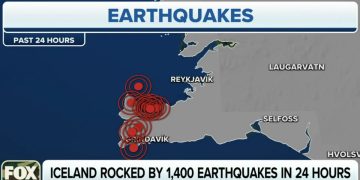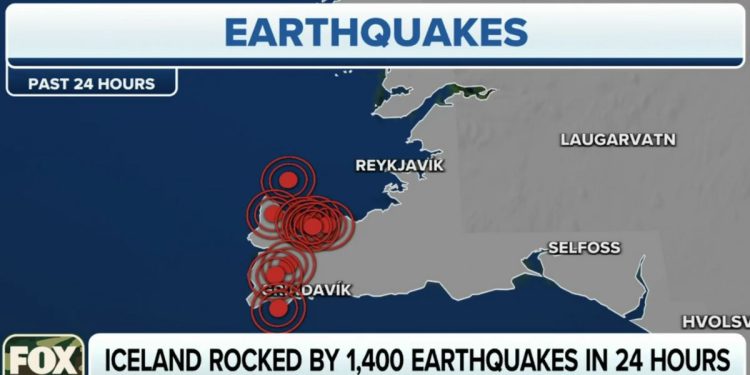Residents of Grindavík, Iceland, have been asked to evacuate after thousands of minor earthquakes indicated the enhanced possibility of a volcanic eruption in the Reykjanes volcanic system.
The coastal town of about 3,000 people is one of the most popular tourist destinations in Iceland, according to travel website KAYAK.
While officials said there was no “immediate danger,” as it is likely that magna would not reach the surface for several days, residents of the town were nonetheless urged to evacuate, Fox Weather reported.
“In case the current intrusion will evolve further and magma will start propagating towards the surface in this area, the most likely outcome would be an effusive eruption,” the Iceland Meteorological Agency told Fox.
“However, the presence of shallow ground-water in the vicinity of the ongoing magmatic accumulation, might trigger some short-lived explosions whenever magma will encounter these reservoirs.”
The area was under an “Orange alert” because of the earthquake activity, meaning that “the volcanic system is showing heightened unrest with increased likelihood of eruption,” according to Fox, which cited the Iceland Met Office.
An Orange alert amounts to a level-3 warning on a 4-point scale.
Fox said that the area has experienced 22,000 small quakes since October 25, with the strongest hitting just after midnight Thursday and coming in at a 4.8 on the Richter scale.
The Washington Post, however, reported Friday afternoon (behind a paywall) that at least seven quakes had been measured at 4.5 or better on that scale — and that two topped 5.0.
“Based on how the seismic activity has evolved since 6 PM today, along with results from GPS measurements, there is a likelihood that a magma intrusion has extended beneath Grindavík,” the IMO told the Post.
The IMO suggested that the coming volcanic eruption could be the largest in the area in at least several years.
“The amount of magma involved is significantly more than what was observed in the largest magma intrusions associated with the eruptions at Fagradalsfjall [in 2021],” the IMO warned.
More ominously for the residents of Grindavík, the earthquakes were observed moving closer to the town.
“The signs that can be seen now … are similar to those seen on the eve of the first eruption at Fagradalsfjall in 2021, and are very similar to the seismic activity that was measured about a month before that eruption,” the IMO said in an earlier alert cited by the Post.
“It is not a question of if but when it erupts,” Thor Thordarson, a professor in volcanology at the University of Iceland, told Bloomberg.
Authorities had begun “building fortifications” in hopes of keeping flowing lava away from some of the area’s most important infrastructure, the outlet reported, which noted that the local volcanic range had been dormant for centuries before suddenly erupting in 2021.
They also shut down the town’s famous “Blue Lagoon” for at least a week.
“Signs of magma coming towards the surface would appear as increased, shallower seismicity and rapid crustal deformation at the surface as well as volcanic tremor, which is a high rate of many small earthquakes,” the IMO warned on November 4, according to Fox. “At the moment no clear signs can be seen of any of this, but the situation can change on short notice.”
This article appeared originally on The Western Journal.


























 Continue with Google
Continue with Google